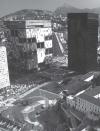Abstract
This article explores an almost forgotten but very important period of the Modern Brazilian Architecture, in which a group of young architects gathered in a city out of the intellectual Brazilian axis (Río - São Paulo), succeeded in many national and international architecture competitions. It is the Paraná Group, name given by the critics of that time to four newly graduate architects from MacKenzie University of Sao Paulo, who migrated to Curitiba in the 60s. They won several prizes for more than 20 years, influencing the new generations of architects from Curitiba, becoming then into a cycle. The critics understood the Paraná Group projects as an improved derivation of the radical Sao Paulo Brutalism, very famous in those years. Recent studies have demonstrated that those projects went even further, proposing a breakthrough between the two main Brazilian tendencies of that time; the one from Rio and the other from Sao Paulo. Partially it is evident when Paraná Group office buildings and horizontal pavilions are analyzed and new elements of typology appear: game, derive, flexibility, random, movement, construction in parts and block separation; elements that would be totally defined later on in the beginning of the 80s, the years of the postmodernism.Apuntes is registered under a Creative Commons Attribution 4.0 International Public License. Thus, this work may be reproduced, distributed, and publicly shared in digital format, as long as the names of the authors and Pontificia Universidad Javeriana are acknowledged. Others are allowed to quote, adapt, transform, auto-archive, republish, and create based on this material, for any purpose (even commercial ones), provided the authorship is duly acknowledged, a link to the original work is provided, and it is specified if changes have been made. Pontificia Universidad Javeriana does not hold the rights of published works and the authors are solely responsible for the contents of their works; they keep the moral, intellectual, privacy, and publicity rights.
Approving the intervention of the work (review, copy-editing, translation, layout) and the following outreach, are granted through an use license and not through an assignment of rights. This means the journal and Pontificia Universidad Javeriana cannot be held responsible for any ethical malpractice by the authors. As a consequence of the protection granted by the use license, the journal is not required to publish recantations or modify information already published, unless the errata stems from the editorial management process. Publishing contents in this journal does not generate royalties for contributors.


